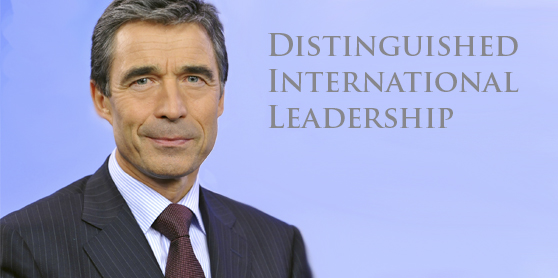 Anders Fogh Rasmussen was born in Ginnerup, Jutland, on January 26, 1953. After passing the baccalaureate at Viborg Katedralskole in 1972, he studied economics at the University of Aarhus, graduating with a Master of Science in economics in 1978. The same year he became member of the Danish Parliament representing the Liberal Party.
Anders Fogh Rasmussen was born in Ginnerup, Jutland, on January 26, 1953. After passing the baccalaureate at Viborg Katedralskole in 1972, he studied economics at the University of Aarhus, graduating with a Master of Science in economics in 1978. The same year he became member of the Danish Parliament representing the Liberal Party.
Related Content |
Rasmussen held numerous positions in government and opposition throughout his political career. From 1987 to 1992 he was minister for taxation and from 1990 to 1992 also minister for economic affairs in the Conservative-Liberal coalition government. As minister for economic affairs and member of the EU’s ECOFIN Council (1990-92), Rasmussen was the Danish negotiator of and signatory to the Maastricht Treaty, which eventually led to the introduction of the single currency, the euro.
From 1992 to 1998 he was spokesman for the Liberal Party and from 1993 to 1998 he was vice chairman of the Parliament’s Economic and Political Affairs Committee. In 1998 he became chairman of the Liberal Party’s national organization and vice chairman of the Parliament’s Foreign Policy Board. After the parliamentary elections in 2001, Rasmussen formed his first government, a coalition consisting of the Liberal Party and the Conservative People’s Party. His government was re-elected in 2005 and 2007 respectively, and he held the position of prime minister until he was elected as future NATO secretary general at the Strasbourg-Kehl Summit in 2009.
During the Danish Presidency of the European Union from July to December 2002, Rasmussen played a key role in the process leading to conclusion of the accession negotiations with ten candidates for EU-membership at the meeting of the European Council in Copenhagen in 2002.
Rasmussen is married to Anne-Mette Rasmussen and they have three children.
